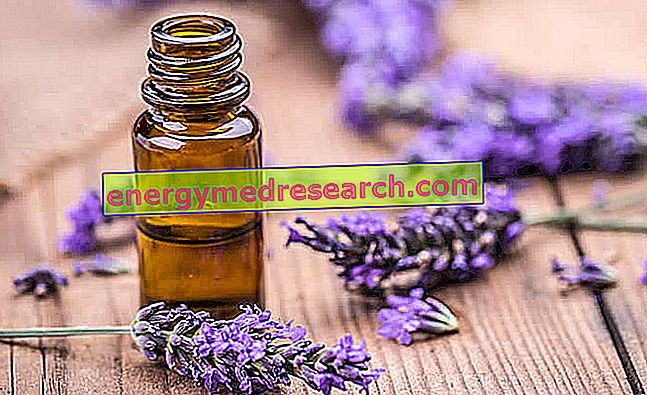What is that
Lavender oil - or, more precisely, lavender essential oil - is a compound obtained from the flowering tops of Lavandula angustifolia, a plant belonging to the Labiatae family.
Lavender oil has many properties, which make it useful in the external treatment of various disorders. In particular, this oil is widely used in aromatherapy, where it is renowned for its calming and relaxing properties.

Features and Composition
Characteristics and Chemical Composition of Lavender Oil
Lavender oil is obtained by steam distillation of the flowering tops of the homonymous plant.
It appears as a colorless liquid, or pale yellow or greenish, with a typical smell and a bitter taste.
Lavender oil is composed of a series of terpenic derivatives (monoterpenes, sesquiterpenes, terpenic esters, etc.). In detail, the main components of this essential oil are linalool (present in percentages of 20-50%) and linalyl acetate (present in percentages of 20-30%). In addition to these substances, they are also present:
- cineole;
- 3-Ottanone;
- Camphor;
- Limonene;
- Terpinen-4-ol;
- Lavandulolo;
- Terpineol-α.
Compared to all the other components, linalool and linalyl acetate are present in very high quantities and this is why most of the properties ascribed to lavender oil are attributed to them.
Property
Property of Lavender Oil
Although it is usually advised to use lavender oil only externally, there have been many studies conducted in vitro and in vivo to determine their potential therapeutic properties, also orally.
Antimicrobial properties
Several studies have confirmed that the essential oil of lavender possesses a discreet antibacterial activity (even if inferior to that possessed by other oils, like, for example, the essential oil of rosemary), associated with an interesting antifungal activity .
In detail, this oil proved to be effective against methicillin-resistant Staphylococcus aureus (MRSA) strains and against vancomycin-resistant Enterococcus faecium strains; as well as being effective against fungi such as Malassezia furfur and Trichophyton rubrum . For this reason, lavender oil is often used as an external remedy to counteract skin disorders such as acne and dandruff.
Sedative properties
Studies conducted in vivo have shown that the essential oil of lavender is able to exert a depressive action on the central nervous system, which is also carried out through the simple inhalation of the product.
Furthermore, some studies have shown that lavender oil is able to exert an anticonvulsant and sedative action. The mechanism of action by which the oil exerts these activities - although not entirely clear - appears to be similar to that of nitrazepam.
Anti-inflammatory and pain-relieving properties
Lavender oil has interesting anti-inflammatory properties, which appear to be exercised through the inhibition of phospholipase C activity. Furthermore, one study found that lavender essential oil is also able to exert an antinociceptive action - therefore, pain relief - similar to that of tramadol (an opioid analgesic drug).
A further study carried out on this oil has shown how it is able to inhibit the degranulation of mast cells and the consequent release of histamine, thus reducing the typical inflammatory component of allergic reactions.
Effects on the gastrointestinal tract
Several studies have shown that lavender oil is able to exert various beneficial effects at the level of the gastrointestinal tract. More precisely, it has antispastic activity and carminative properties that make it particularly useful in case of gastric disorders, colic and flatulence.
Of course, to carry out similar activities, lavender oil must be taken orally. However, the internal use of the product is usually not recommended and, in any case, it should only be done after asking the advice of your doctor.
uses
What is Lavender Oil used for?
Given the numerous properties it is endowed with, the uses of lavender oil are manifold.
In addition to use in aromatherapy as a remedy for insomnia and agitation, lavender oil can also be used in the event of:
- Insect bites : applied in purity - or diluted in some aloe gel - lavender oil is able to give relief from annoying symptoms, such as itching and burning, caused by insect bites.
- Acne : adding a few drops of essential oil to a face cream to be applied to the areas affected by acne can be useful to alleviate the disorder. This action is attributable to the antimicrobial activity ascribed to the oil.
- Dandruff : performing regular massages of the scalp with lavender oil (possibly diluted with aloe gel), besides being relaxing, can be a very useful remedy to keep the dandruff problem under control. Alternatively, you can add a few drops of oil to the normal shampoo. The control action exerted against this scalp problem is due to the antifungal properties of the oil.
- Rheumatic pain and muscle tearing : lavender oil - used in massage lotions and oils - can be useful not only to promote relaxation, but also to reduce pain and inflammation resulting from muscle strains and rheumatism.
- Cooling diseases : used to perform fumigations, lavender essential oil is able to exert a beneficial action on the respiratory tract tested by colds and influences.
Side effects
If properly used, lavender oil should not cause side effects, as it is well tolerated by most individuals. However, in particularly sensitive individuals, the application of the oil in question could cause irritation, burning, redness, dermatitis and photosensitivity reactions. If any of these side effects appear, it is advisable to immediately rinse the area of application and stop the treatment.
When taken orally, however, lavender essential oil can cause adverse effects on the gastrointestinal system, such as nausea and vomiting.
Finally, we must not forget the possibility of allergic reactions in sensitive individuals.
Overdose
As mentioned, lavender essential oil should be taken orally only in certain circumstances and only after asking the doctor for a preliminary opinion.
However, in the event of accidental ingestion of high doses of lavender oil, even very serious symptoms may occur, such as:
- Depression of the central nervous system;
- Respiratory depression;
- Headache;
- He retched;
- Constipation;
- Convulsions.
In such a situation, you must contact your doctor immediately or go to the nearest emergency room.
Contraindications
When used externally, lavender oil has no particular contraindications, except that of avoiding its use on damaged skin.
Oral intake of the product, on the other hand, is absolutely contraindicated in pregnancy and during breastfeeding.
Of course, both internal and external use of lavender oil is contraindicated in case of known hypersensitivity to any of its components.



